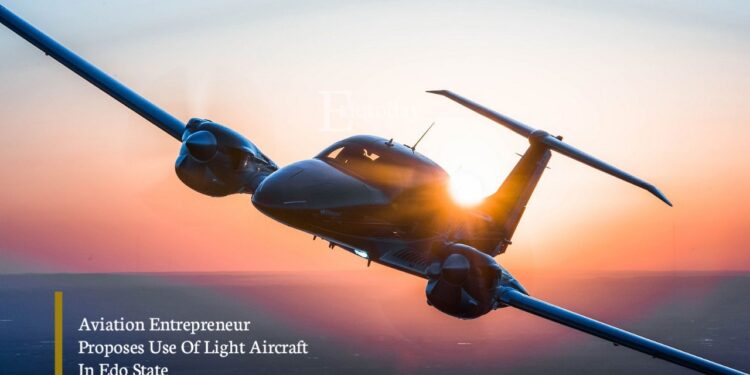Ehimenmen Odia, a U.S.-based aviation entrepreneur who was born in Edo State, and his partner, Morrison Okunbor, have expressed hope that the Benin Aero Club, the state’s first of its kind, could help with issues like tourism, medical emergencies, and insecurity.
According to Odia, the Executive Officer of Auxano Aviation, the industry’s investment offers beginners and many interested Nigerians the chance to learn how to fly light, single-engine aircraft.
Following the two, the program also acts as a feeder system for bolstering and supplying the workforce that Nigeria’s aviation sector needs. They noted that Edo State might become the hub for regional aircraft manufacturing and assembly in a few years, which would improve the socioeconomic standing of the state.
At the conclusion of a two-day awareness program designed to foster youngsters’ interest in aviation and encourage them to think about flying as a career option from a young age, the aviation entrepreneurs gave a speech. Students were exposed to aviation firsthand during the program, which was held at Benin Airport.
The arrival of an Australian-built Jabiru light aircraft was met with excitement and enthusiasm from the invited students. Odia said it was a realization of his childhood goal, which started when he enrolled in pilot school in the United States. He also thanked the Ministry of Aviation and Governor Monday Okpebholo of Edo State for creating an atmosphere that made it possible to begin the project.
With a background on his lifelong dream, the Ambrose Alli University (AAU), Ekpoma Accounting graduate said the idea to establish the Aero Club was nurtured in the U.S. realizing that many American business owners and professionals used light aircraft for accessibility and efficiency in service delivery.
“Before I went to the U.S., I always had a love for aviation. I remember when I was in the University of Benin Staff School in Ugbowo, we used to come to GRA and visit the airport as kids to see the planes. The mystery of these big birds flying stayed with me.”
“Years later, when I got to the United States, I saw how easy it was to get my private pilot’s license. In Nigeria, I wanted to be a pilot and even tried to join the military, but it wasn’t easy. However, when I got to the U.S., it was a lot easier,” Odia enthused.
“Close to my house was a small airport with 300 planes in a hangar. In the morning, you would find doctors, lawyers, and businesspeople flying their planes to work and back. That’s where the idea of doing this in Nigeria came from.”
“Why can’t we have this kind of facility here? Why can’t a lawyer in Benin have a case in Lagos and return the same day? Why can’t a specialist doctor visit five states and still be home by night?”
“My vision is to improve efficiency. My partner, Morrison Okunbor, and I carefully studied the aviation environment and discovered that in most successful aviation countries, there are highly efficient and functional general aviation sectors. All pilots start by learning to fly small planes.”
“With our Aero Club, we intend to remove the mysticism and class barriers surrounding aviation. If there is adequate support and investment, the club can encourage more people—both young and old—to learn how to fly.”
On his part, the Vice President of Benin Aero Club, Morrison Okunbor, praised Governor Monday Okpebholo for his steadfast support from the project’s inception. He stated that the Aero Club eliminates the need for capital flight by allowing aspiring pilots to train locally instead of going abroad.
“Coming from a background where aviation was a norm, thanks to my elder brother, the late Capt. Hosa Okunbo, this is our little contribution to igniting that zeal in those who want to fly.”
“You can imagine the amount of capital flight spent on training abroad, but now, it can be done here. This aircraft is the most suitable for learning to fly due to its high safety level and gliding capability.”
“We commend the government for making this possible. In a few months, we will have our own hangars to service the West African market. These aircraft can also be used to tackle insecurity. In South Africa, they are deployed to deter poachers, and we can use them similarly against banditry.”












